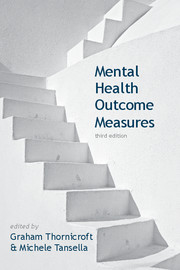Book contents
- Frontmatter
- Contents
- List of tables, boxes and figures
- List of contributors
- Foreword
- Foreword
- Preface: an evolving perspective of mental health outcome measures
- Part I Methodological issues
- Part II Domains of outcome measurement
- 5 Global functioning scales
- 6 Satisfaction with mental health services
- 7 Measuring family and carer burden in severe mental illness: the instruments
- 8 Measures of quality of life for persons with severe mental disorders
- 9 Measuring social disabilities in mental health and employment outcomes
- 10 Measuring the costs of mental healthcare
- 11 Assessing needs for mental healthcare
- 12 Measuring stigma and discrimination related to mental illness
- Part III Symptom severity outcome measures
- Part IV International approaches to outcome assessment
- Index
7 - Measuring family and carer burden in severe mental illness: the instruments
from Part II - Domains of outcome measurement
Published online by Cambridge University Press: 02 January 2018
- Frontmatter
- Contents
- List of tables, boxes and figures
- List of contributors
- Foreword
- Foreword
- Preface: an evolving perspective of mental health outcome measures
- Part I Methodological issues
- Part II Domains of outcome measurement
- 5 Global functioning scales
- 6 Satisfaction with mental health services
- 7 Measuring family and carer burden in severe mental illness: the instruments
- 8 Measures of quality of life for persons with severe mental disorders
- 9 Measuring social disabilities in mental health and employment outcomes
- 10 Measuring the costs of mental healthcare
- 11 Assessing needs for mental healthcare
- 12 Measuring stigma and discrimination related to mental illness
- Part III Symptom severity outcome measures
- Part IV International approaches to outcome assessment
- Index
Summary
Until the middle of the twentieth century, neither society nor psychiatry as the principal responsible discipline could offer people with severe mental illness much more than hospital care for periods ranging from months to years. The recognition of the detrimental effects of hospitalisation and developments in psychopharmaceutical, psychotherapeutic and social treatments gave impetus to deinstitutionalisation and opened doors to new approaches now associated with community psychiatry and community care. Over the past five decades this movement away from hospital care resulted in a great interest in the community adjustment of psychiatric patients (Weissman, 1975, 1981). Treating patients in the least restrictive environment and consumer empowerment made social functioning and social performance important concepts, not only for patients, practitioners and researchers, but certainly also for patients’ family and carers (Fisher et al, 1990). Confronted with caring tasks that had been taken away from them since the start of institutionalism in the early nineteenth century, family members had to learn to cope again with the dysfunctional behaviour inherent in most of the severe mental illnesses.
Family and carer burden
Caring refers to the relationship between two adult individuals who are typically related through kinship. One, the carer, assumes an unpaid and unanticipated responsibility for another, the care recipient, whose mental health problems are disabling, long term in nature and essentially incurable. The care recipient is unable to fulfil the reciprocal obligations associated with normative adult relationships and the mental health problems are serious enough to require substantial amounts of care. What makes the situation particularly burdensome is the addition of the caring role to the already existing family role (Gubman & Tessler, 1987; Gubman et al, 1987; Gallop et al, 1991). Although the concept is referred to as ‘family’ burden, most studies have sampled ‘primary carers’. Carer burden has a narrower perspective than family burden, as the latter includes the consequences for family members other than the main carer, such as the interpersonal relations within the family, the consequences for children of patients and the social network of the whole family.
- Type
- Chapter
- Information
- Mental Health Outcome Measures , pp. 116 - 134Publisher: Royal College of PsychiatristsPrint publication year: 2010



